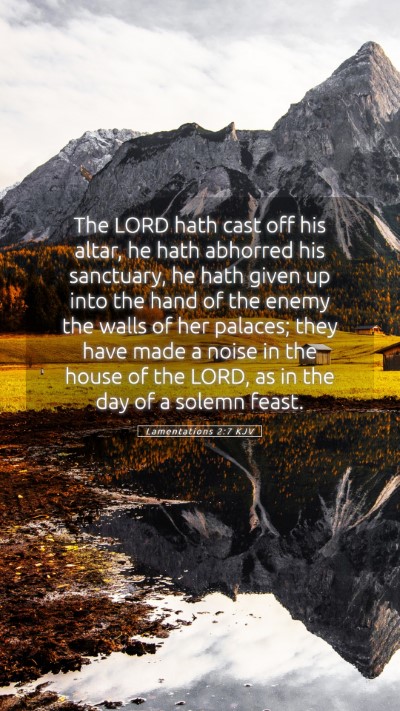Lamentations 2:7 - Bible Verse Meaning and Commentary
Lamentations 2:7 states: "The Lord hath cast off his altar, he hath abhorred his sanctuary, he hath given up into the hand of the enemy the walls of her palaces; they have made a noise in the house of the Lord, as in the day of a solemn feast." In this verse, the profound emotions associated with the destruction of Jerusalem and the temple are expressed, emphasizing God's judgment and the devastation felt by His people.
Key Themes in Lamentations 2:7
- Divine Judgment: This verse reflects the theme of God’s disfavor towards Israel due to their idolatry and sin. It serves as a reminder of the consequences of turning away from God.
- Loss of Sanctity: The statement that God has "cast off his altar" illustrates the loss of sacredness in worship and the abandonment of the temple, highlighting a tragic moment in Israel’s history.
- Destruction and Despair: The cries related to the destruction of the temple signal profound mourning and hopelessness among the people, evidencing the weight of national catastrophe.
Commentary Insights
The insights from respected public domain commentaries provide an in-depth understanding of this verse:
Matthew Henry Commentary: Henry emphasizes the sorrow and despair that consume the people of God in the wake of His judgment. He notes that God's rejection of the temple signifies a severe rebuke for the sins of the nation. The temple that once stood as a symbol of divine presence is now viewed as abandoned, leading to immense grief among the faithful.
Albert Barnes Notes: Barnes highlights the phrase "given up into the hand of the enemy," indicating the loss of God’s protective hand. This abandonment of Jerusalem implies a significant turning point in the relationship between God and His people, marked by the consequences of their rebellion. He also relates this to the broader context of God's covenant with Israel, illustrating how their unfaithfulness resulted in this dire state.
Adam Clarke Commentary: Clarke offers a poignant reflection on the implications of God’s refusal to protect His altar. He elaborates on the societal and spiritual consequences of such an event, stating that it leads to chaos within the community that once revered God. Clarke's commentary emphasizes the need for repentance and the acknowledgment of divine authority to restore the nation.
Application and Reflection
This verse holds significant application for contemporary readers seeking Bible verse interpretations and Bible study insights. It challenges believers to reflect on their relationship with God and the ways in which they worship:
- Examine Priorities: Are there altars in our lives that have become neglected or defiled? This scripture provokes thought on whether we prioritize our relationship with God.
- Community Impact: The collective sin of the people led to destruction. It emphasizes the importance of collective righteousness and accountability within communities.
- Hope in Restoration: Although the verse highlights judgment, it also indicates that God's temporary chastisement can lead to recognition and eventual restoration, driving believers to hope for renewal.
Conclusion
In understanding Scripture, Lamentations 2:7 serves as a grave reminder of the impact of sin and the seriousness of divine judgment. Engaging with such verses provides deep insights into the nature of God’s relationship with His people, and significant Bible verse explanations can help believers navigate challenging texts.
Related Bible Cross References
- Jeremiah 7:14 - Highlights God’s rejection of His temple due to Israel's sins.
- Ezekiel 10:18 - Discusses the glory of the Lord departing from the temple.
- Psalm 78:60 - Mentions God abandoning the dwelling place at Shiloh.


